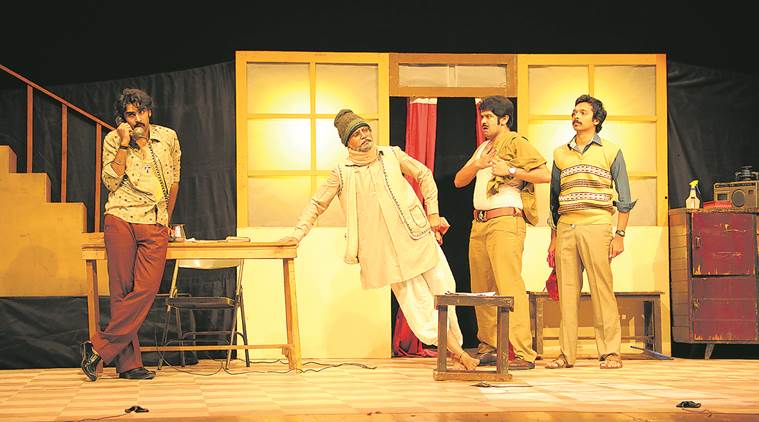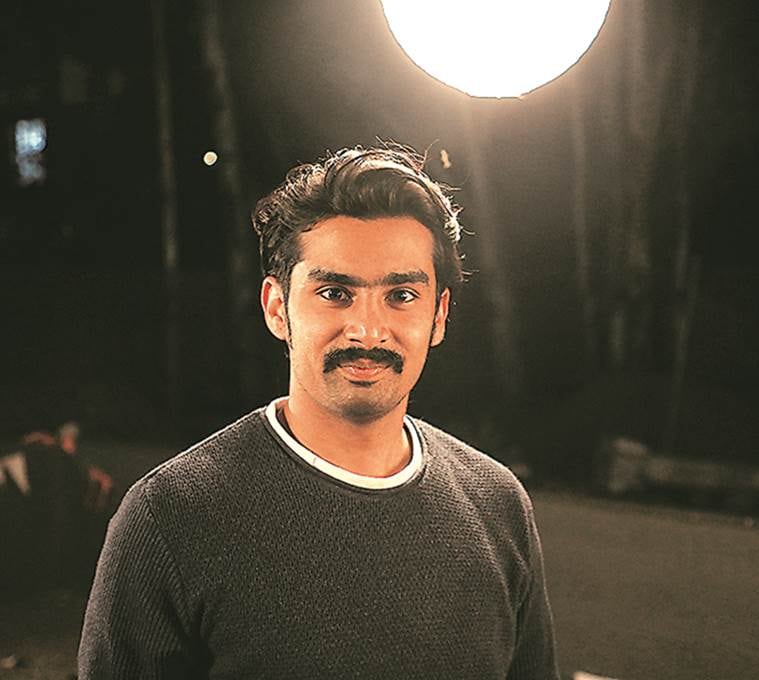 Mickey is a play set in a barbershop
Mickey is a play set in a barbershop
Most nights, as Suraj Parasnis is studying for his CA final exams, a little child comes and peeps at him from behind a door. Parasnis waves and the boy smiles. “When I move towards him, the child runs away. I go after him but he enters a wall from where he continues to look at me and grin,” says Parasnis. He adds, “It is possible for me to imagine such things and become very scared.”
Even when Parasnis is turned out like a tax consultiant — that is his day job — in a collared shirt and neat trousers, a part of his mind is seeking out drama. At a cafe, he observes how people behave when they are deciding where to sit. While watching the news, he is triggered by the way survivors of calamity speak. “I never say, ‘Let me look for something interesting’. I see important events everywhere and, one fine day, something I have seen somewhere long ago will emerge in a play I am directing,” he says.
At 28, Parasnis belongs to the crop of young theatre practitioners of Pune who are drawing hundreds of students from the city’s 10 universities into theatres; his plays have also been staged at the Mumbai’s prestigious Kala Ghoda Festival and the Centrestage Festival, NCPA. Mickey, a Marathi play that was first performed in Pune in 2018, has been nominated for Best Play and Best Ensemble, among others, at the Mahindra Excellence in Theatre Awards (META).
Mickey is set in a barbershop run by Keshav, his father, Sakharam and a friend, Anthony. They are heavily in debt when a body lands up. Outside, Pune is under curfew after the assassination of Indira Gandhi. “The three barbers form a twisted plan to use the corpse to solve their financial woes. The play is a character study of what happens to the best and worst of us when the pressure is high and morals are low,” says Parasnis.
 Suspense is Parasnis’s forte and he delights in taking audiences through an emotional churn.
Suspense is Parasnis’s forte and he delights in taking audiences through an emotional churn.
Suspense is Parasnis’s forte and he delights in taking audiences through an emotional churn. Two times winner of Outstanding Director and Outstanding Play for Thespo — a national level theatre festival in Mumbai — for plays Patient (2011) and Kabaadi Uncut (2013), he keeps his theatre on the fine line between entertainment and informative. Theatron, the group to which he belongs, made its entry with a horror-comedy, Anathema, which revolves around three young men in Pune, who live in a PG whose other inhabitant is a deadly supernatural being. Eight years on, Anathema is still playing to packed halls where audiences scream in fear as strange things happen on stage — a light or fan switches on without reason, a neighbourhood dog falls down dead and a paranormal expert runs off scared. In 2019, Parasnis directed two contrasting genres of theatre , the suspense play Kabootar Ja Ja and a social drama, titled Daavikadun Chauthi Building. The former revolves around a housewife who fills her empty hours with pigeons and Crime Patrol while the latter follows the drama in four homes of a residential society.
“I like exploring all genres,” says Parasnis, who works on strong scripts, usually by Virajas Kulkarni and Siddesh Purkar. Social concerns are wrapped in gripping action. That Anathema is as much a ghost story as a critique of parenting strikes audiences hours after the performance. After a show of Kabootar Ja Ja at Bharat Natya Mandir, Pune, in 2018, crowds of college students hung around talking about how little is known about the challenges a homemaker faces. “We want our mothers to be our support systems all our lives. But we never find out what happens when we leave the house,” said one college student.
Parasnis has been a performer most of his life. At nine, he started acting after attending a show of the classic Marathi mono-act play, Varhad Nighalay Londonla. His father enrolled him at a theatre academy. This was where Parasnis became friends with the other founders of Theatron — Kulkarni and Shivraj Waichal — and performer Omkar Goghale. “At that age, all we knew was that theatre was fun. We are still mad about creating plays,” says Parasnis. “For me, directing is meditative. There are 15-20 people in a room, everybody of a different age, from a different place and with a different life story, and we get together to create drama,” he says.